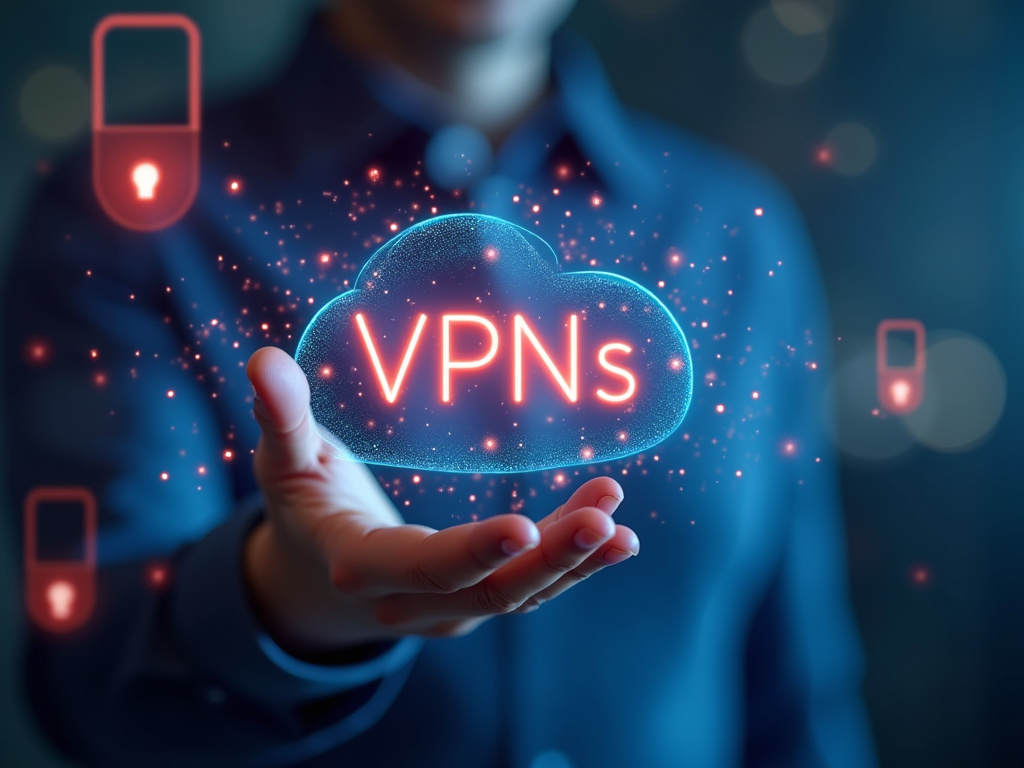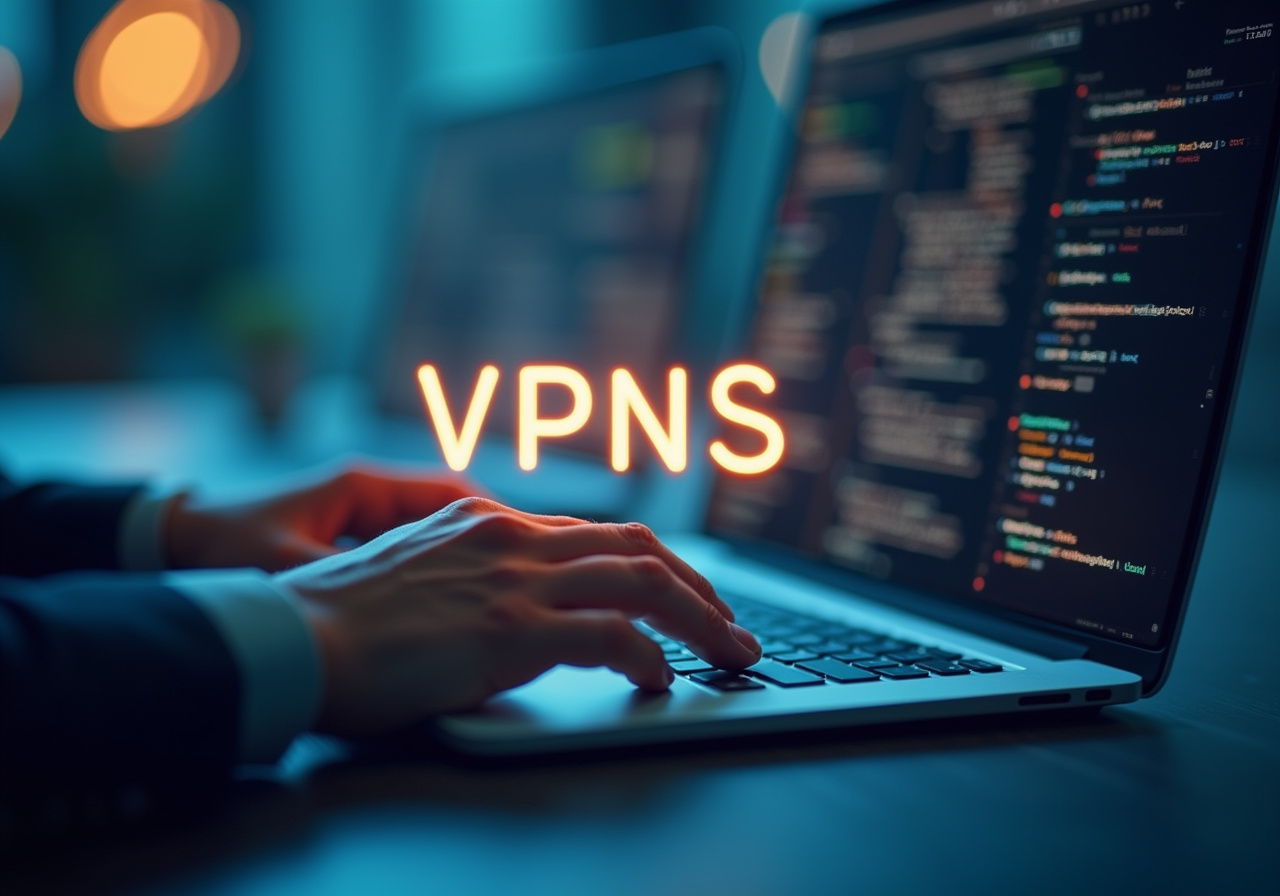VPNs for Digital Agencies: Protecting Client Deliverables

VPNs for Digital Agencies: Protecting Client Deliverables in the Modern Landscape
In today's digitally driven world, digital agencies stand as cornerstones for businesses seeking to amplify their online presence, craft compelling marketing narratives, and navigate the intricate landscape of digital transformation. These agencies handle a diverse array of client deliverables, ranging from meticulously crafted advertising campaigns and strategic marketing plans to sensitive financial data, proprietary intellectual property, and confidential customer information. The trust placed upon these agencies is immense, and with that trust comes a profound responsibility: the safeguarding of client data.
A single data breach or security lapse can have devastating consequences, leading to significant financial losses, irreparable damage to reputation, legal ramifications, and the erosion of hard-earned client trust. The inherent nature of agency work, characterized by remote teams, collaborative projects, frequent data transfers, and reliance on diverse networks, creates a complex web of potential vulnerabilities. These vulnerabilities can be exploited by malicious actors, resulting in data interceptions, unauthorized access, and the compromise of sensitive information.
Therefore, for digital agencies, implementing robust security measures is not merely a best practice; it is an existential imperative. Amidst a comprehensive security strategy, a Virtual Private Network (VPN) emerges as a cornerstone for fortifying an agency's defenses and ensuring the confidentiality and integrity of client deliverables. An `agency VPN` acts as a secure and encrypted tunnel, channeling all data transmitted between the agency's systems and the outside world.
This encryption process effectively scrambles the data, rendering it unintelligible to unauthorized parties who may attempt to intercept it. Think of it as wrapping a valuable package in layers of protective shielding before sending it through the postal system. This secure tunnel safeguards sensitive client information, shielding it from prying eyes and malicious actors lurking on public Wi-Fi networks, in unsecured data channels, or within compromised systems.
The importance of a VPN is particularly amplified when agency employees or contractors are working remotely, accessing the internet from coffee shops, co-working spaces, or their homes. Public Wi-Fi networks, often lacking robust security protocols, are notorious hotspots for cybercriminals seeking to intercept data. With a VPN in place, the encrypted connection ensures that even if an attacker manages to intercept the data, they will be unable to decipher it.
Beyond the immediate shielding effect, a VPN empowers agencies to meet their stringent compliance obligations. Regulations like the General Data Protection Regulation (GDPR) in Europe, the California Consumer Privacy Act (CCPA) in the United States, and other data privacy laws worldwide mandate strict data protection measures. By deploying a VPN and demonstrating a commitment to data encryption and secure data handling practices, agencies can fulfill their regulatory requirements and avoid hefty fines or penalties.
This focus on `client security` further demonstrates a proactive and responsible approach to safeguarding client data. Furthermore, a VPN fosters a more secure and efficient workflow by enabling seamless and secure file sharing, remote access to internal resources, and enhanced collaboration among team members, regardless of their physical location. Agency employees can securely access client servers, share large files containing sensitive information, and communicate with clients and partners without compromising data integrity or confidentiality.
The application of `deliverable protection` protocols enhances productivity by removing barriers to collaboration while simultaneously mitigating the risk of data leaks or unauthorized access. In essence, investing in an `VPN for agencies` is a proactive measure that transcends mere cost considerations; it is a strategic investment that safeguards client deliverables, strengthens the agency's security posture, fosters a culture of data protection throughout the organization, and cultivates an environment of trust and confidence with clients.
The successful implementation of a VPN within a digital agency extends far beyond the simple installation of software on individual devices. It necessitates a strategic and holistic approach that carefully considers the agency's existing IT infrastructure, established workflows, and overarching security policies. A meticulously designed VPN deployment should seamlessly integrate with the agency's broader security framework, acting as a cohesive component that complements existing security measures, such as firewalls, intrusion detection systems, access control mechanisms, and endpoint protection solutions.
One of the initial and most crucial steps in implementing a VPN is the formulation of clear, concise, and comprehensive security policies that explicitly outline how the VPN should be used, what specific types of data require protection through the VPN, who within the organization has authorized access to the VPN network, and the consequences of violating these policies. These policies should be meticulously documented, readily accessible to all employees and contractors, and reinforced through regular training sessions to ensure that every individual comprehends their responsibilities and the importance of adhering to the established security protocols. The VPN configuration itself should be meticulously tailored to align with the agency's specific operational requirements, the sensitivity of the data it handles, and the potential threat landscape it faces.
This includes carefully selecting the appropriate VPN protocols, meticulously configuring encryption settings, and establishing granular access control rules that restrict access to sensitive resources based on user roles, responsibilities, and project affiliations. Robust encryption protocols, such as OpenVPN, IKEv2/IPsec, and WireGuard, should be prioritized to ensure the confidentiality and integrity of the data stream. These protocols employ sophisticated encryption algorithms that render the transmitted data unreadable to unauthorized parties, even if they manage to intercept it.
Access control rules should be implemented with precision to grant users access only to the resources that are strictly necessary for them to perform their duties. This principle of least privilege minimizes the potential damage that could be caused by a compromised account or a malicious insider. For instance, employees working on a specific client project should only have access to the files, servers, and applications related to that particular project, preventing them from accessing unrelated data or resources.
A critical aspect of VPN implementation is its integration with the agency's existing identity and access management (IAM) systems. Seamless integration with IAM systems enables the agency to centrally manage user accounts, enforce robust password policies, such as requiring strong, unique passwords and mandatory password resets, and implement multi-factor authentication (MFA) for an added layer of security. `Collaboration safety` depends on these measures.
MFA adds a crucial layer of protection by requiring users to provide two or more distinct forms of authentication before being granted access to the VPN network. Typically, this involves combining something the user knows (e.g., a password), something the user has (e.g., a security token or smartphone), or something the user is (e.g., a biometric scan). MFA significantly reduces the risk of unauthorized access, even if a user's password has been compromised through phishing or other means.
Another important consideration is the physical and logical location of the VPN servers. Agencies should carefully evaluate the geographic distribution of the VPN provider's servers, selecting providers that have servers strategically located in regions that align with the agency's business operations and client locations. This ensures optimal performance and compliance with local data privacy laws.
`Agency VPN` solutions should also offer redundancy in server locations to mitigate the risk of service disruptions in the event of outages. Furthermore, a comprehensive VPN solution should provide robust logging and monitoring capabilities. This allows the agency to meticulously track VPN usage, identify potential security threats, detect anomalies, and thoroughly investigate security incidents.
Logs should be regularly reviewed and analyzed to proactively identify any suspicious activity, unauthorized access attempts, or policy violations. Implementing these systems assures the effectiveness of the `deliverable protection`.
Selecting the most appropriate VPN solution for a digital agency is a decision demanding meticulous consideration, weighing numerous factors to align with specific needs, budgetary constraints, and the level of in-house technical expertise. The VPN market presents a plethora of providers, each boasting distinct features, diverse pricing structures, and varying degrees of security protocols. Navigating this complex landscape requires a systematic approach to ensure the chosen `agency VPN` truly safeguards client deliverables and strengthens overall security posture.
A primary determinant resides in the VPN provider's established security track record. Performing thorough due diligence to investigate the provider's history of security incidents, data breaches, and identified vulnerabilities is paramount. Scrutinize their responses to past incidents, evaluate the transparency of their security practices, and ascertain their commitment to swiftly addressing emerging threats.
Equally important is an assessment of the provider's adherence to industry-recognized security best practices. Do they conduct regular, independent security audits, engaging external experts to probe their systems for weaknesses? Do they perform routine penetration testing, simulating real-world attacks to identify and remediate vulnerabilities?
How diligently do they apply security patches and updates to their software and infrastructure to address known security flaws promptly? Moreover, delve into the VPN provider's privacy policy, scrutinizing its clarity and comprehensiveness. The policy should explicitly articulate how the provider collects, utilizes, and protects user data.
Prioritize providers that vehemently assert a "no-logs" policy, signifying that they refrain from recording or storing user activity, browsing history, or connection logs. This commitment is fundamental for upholding client confidentiality and adhering to stringent data privacy regulations. Avoid providers that engage in logging user activity or, worse, monetize user data by selling it to third-party advertisers or data brokers.
A transparent and unwavering no-logs policy is indispensable for fostering trust and ensuring `client security`. Another critical factor revolves around the VPN provider's network infrastructure. Evaluate the geographic distribution of their servers, ensuring they span across strategic locations pertinent to your agency's business operations and client base.
A geographically diverse server network translates to optimized performance, reduced latency, and reliable connectivity for users accessing the VPN from various locations. Prioritize providers that operate a robust and well-maintained network, boasting ample bandwidth and redundant infrastructure to mitigate the risk of service disruptions. The VPN solution's compatibility with a spectrum of devices and operating systems is equally crucial.
Verify that the chosen VPN supports the devices utilized by your agency's employees and contractors, encompassing laptops, desktops, smartphones, and tablets. Ensure compatibility with prevalent operating systems, including Windows, macOS, iOS, and Android. A user-friendly interface is paramount to facilitate seamless adoption and minimize the learning curve for users.
The VPN client should be intuitive, easy to navigate, and provide clear instructions for connecting to the VPN server and configuring security settings. To enhance `deliverable protection` further, consider VPN solutions that offer advanced security features. These may include a kill switch, which automatically terminates internet connectivity if the VPN connection drops, preventing unencrypted data from leaking.
DNS leak protection ensures that DNS queries are routed through the VPN server, preventing potential DNS leaks that could expose browsing activity. Split tunneling allows users to selectively route specific traffic through the VPN while allowing other traffic to bypass it, optimizing bandwidth usage and performance for non-sensitive applications.
Beyond the core functionalities of encryption and secure tunneling, a modern VPN solution for digital agencies should offer a suite of advanced features designed to enhance collaboration, streamline workflows, and further fortify data protection. These features often go beyond basic security, addressing the unique challenges and demands of a dynamic agency environment, particularly when dealing with sensitive client deliverables and geographically dispersed teams. Secure file sharing capabilities are paramount for agencies that frequently exchange large files containing confidential information with clients, partners, and remote employees.
A robust VPN solution should integrate secure file-sharing protocols, enabling users to upload, download, and share files within an encrypted environment, minimizing the risk of interception or unauthorized access during transit. Look for VPNs that support secure protocols like SFTP (Secure File Transfer Protocol) or offer built-in file-sharing features with end-to-end encryption. Remote access capabilities are equally crucial, allowing agency employees and contractors to securely access internal resources, client servers, and project files from any location.
The VPN should provide a secure and authenticated connection to the agency's internal network, enabling remote users to work as if they were physically present in the office. This eliminates the need for insecure workarounds, such as emailing sensitive files or using unencrypted remote desktop connections. To enhance `collaboration safety`, consider VPNs that integrate with existing collaboration platforms, such as Slack, Microsoft Teams, or Google Workspace.
This allows agency employees to seamlessly collaborate on projects, share files, and communicate securely within their familiar work environment. Look for VPNs that offer secure integrations or provide dedicated plugins for these platforms. A critical, often overlooked feature is bandwidth optimization.
Digital agencies frequently deal with bandwidth-intensive tasks, such as video editing, graphic design, and large file transfers. A VPN can sometimes introduce overhead, potentially impacting performance. Select a provider that utilizes efficient VPN protocols and offers server locations optimized for speed and bandwidth.
Some VPNs offer features like traffic prioritization, allowing agencies to prioritize bandwidth for critical applications or tasks. A dedicated IP address offers enhanced security and control. Most VPNs utilize shared IP addresses, meaning that multiple users share the same IP address when connected to the VPN.
While this provides a degree of anonymity, it can also lead to occasional inconveniences, such as CAPTCHAs or website restrictions triggered by other users' activities. A dedicated IP address, assigned exclusively to your agency, eliminates these issues and provides greater control over your online reputation. It can also be used for whitelisting purposes, allowing you to restrict access to sensitive resources to only your agency's dedicated IP address.
Device management features can be beneficial, especially for agencies with a large number of employees and devices. Some VPN solutions offer device management capabilities, allowing administrators to remotely configure VPN settings, enforce security policies, and monitor device activity. This simplifies VPN management and ensures that all devices are properly secured.
To assure `client security`, enterprise-grade VPN solutions often offer advanced reporting and analytics features, providing insights into VPN usage, security threats, and network performance. These reports can help agencies identify potential security risks, monitor compliance with security policies, and optimize VPN performance. Look for VPNs that offer customizable reports and dashboards, allowing you to track key metrics and gain a comprehensive understanding of your agency's security posture.
Finally, seamless integration with existing security tools is a must. The VPN shouldn't operate in isolation but should integrate seamlessly with the agency's existing security ecosystem, including firewalls, intrusion detection systems, and security information and event management (SIEM) systems. This allows for a coordinated and comprehensive approach to security.
Maintaining a robust security posture is not a one-time implementation but an ongoing process that necessitates continuous monitoring, regular updates, and proactive adaptation to evolving threats. Implementing an `agency VPN` is a crucial step, but it's only one piece of the puzzle. To maximize its effectiveness and ensure long-term `deliverable protection`, agencies must adopt a proactive and vigilant approach to VPN management and overall security.
Continuous monitoring of VPN activity is essential for detecting anomalies, identifying potential security breaches, and ensuring compliance with security policies. Agencies should implement monitoring tools that track VPN usage patterns, identify unusual login attempts, and detect suspicious traffic flows. These tools should generate alerts for any anomalous activity, allowing security personnel to quickly investigate and respond to potential threats.
Regular security audits are crucial for assessing the effectiveness of the VPN implementation and identifying any vulnerabilities or weaknesses in the system. These audits should be conducted by independent security experts who can objectively evaluate the agency's security posture and provide recommendations for improvement. The audits should cover all aspects of the VPN implementation, including configuration settings, access control rules, logging policies, and security protocols.
Timely software updates and patch management are critical for addressing known vulnerabilities and preventing exploitation by attackers. VPN providers regularly release updates to their software to fix security flaws and improve performance. Agencies should ensure that all VPN clients and servers are promptly updated with the latest patches to mitigate the risk of exploitation.
In addition to VPN software updates, agencies should also ensure that all other software and systems are regularly updated with the latest security patches. Ongoing employee training and awareness programs are essential for educating employees about security threats and best practices for using the VPN. Employees should be trained to recognize phishing scams, avoid clicking on suspicious links, and protect their passwords.
They should also be educated about the agency's VPN security policies and the consequences of violating those policies. Regular phishing simulations can help to reinforce employee training and identify individuals who may be more susceptible to phishing attacks. Incident response planning is critical for minimizing the damage caused by security breaches.
Agencies should develop a comprehensive incident response plan that outlines the steps to be taken in the event of a security breach, including identifying the source of the breach, containing the damage, restoring systems, and notifying affected parties. The incident response plan should be regularly tested and updated to ensure its effectiveness. `Client security` involves regulatory compliance.
Agencies must stay informed about relevant data privacy regulations and ensure that their VPN implementation complies with those regulations. This may involve implementing specific security controls, such as data encryption and access control, and documenting compliance efforts. Regular reviews of compliance policies and procedures are essential for ensuring ongoing compliance.
The evolving threat landscape demands continuous adaptation. Security threats are constantly evolving, and agencies must adapt their security measures to stay ahead of the curve. This involves staying informed about the latest security threats, monitoring security advisories, and updating security policies and procedures accordingly.
Threat intelligence feeds can provide valuable insights into emerging threats and help agencies proactively protect themselves. The right `VPN for agencies`, combined with these proactive measures, ensures `collaboration safety` and robust protection for all client deliverables , securing the agency's reputation and fostering lasting client trust.
Stay Updated
Get the latest VPN news, tips, and exclusive deals to your inbox.




